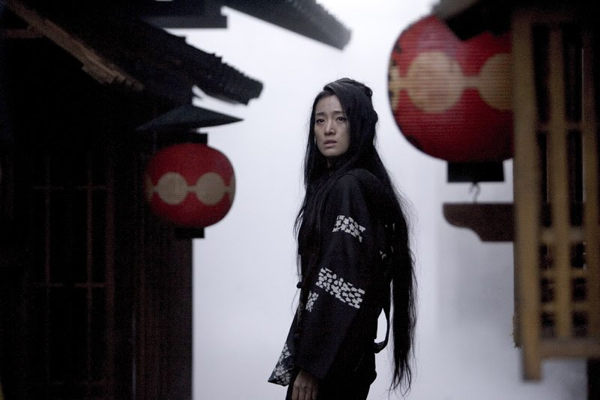Movie review by Greg Carlson
A glacially-paced miscalculation, “Memoirs of a Geisha” is among the weakest of the large budget studio films in the hunt for this year’s award-season glory. Directed by Rob Marshall as his follow-up to the Academy Award-winning “Chicago,” “Memoirs” clumsily adapts Arthur Golden’s wildly popular 1997 novel. Eschewing subtlety and detail for garishness and simplicity, the screen version of “Memoirs” arrives as watered-down melodrama, and will likely appeal only to aficionados of the Far East as it is so often depicted in American popular culture.
Dropping non-Japanese performers into several key roles (a move that caused a minor publicity stir as the movie was ramping up for release), “Memoirs” winnows the plot into a blood-simple retelling of the “Cinderella” fairytale, complete with stand-in prince and fairy godmother and virtually all the other familiar plot points intact. Zhang Ziyi (now credited with the customary name order switched to the American style as Ziyi Zhang) plays Sayuri, a poor girl sold into servitude as a pre-teen. Desperate to reunite with her sister and escape the cruel conditions of the okiya, or geisha house, where she is essentially imprisoned, Sayuri instead finds herself under the wing of the wise Mameha (Michelle Yeoh).
This alliance is set up precisely to oppose top-geisha Hatsumomo (Gong Li), a calculating and manipulative rival whose viciousness seemingly knows no limits. Somewhat awkwardly, Sayuri romantically idealizes a generous and much older man known as the Chairman (Ken Watanabe), despite the fact that she meets him when still a little girl. Time, however, is a flexible concept in “Memoirs,” and many years are compressed to keep the story chugging along. Additionally, Marshall is far more interested in eye-popping costumes and production design, and everything else takes a back seat as a result.
You never forget that that you are watching a simulacrum filtered through a decidedly Western lens, but that fact is cold comfort given the script’s unwavering insistence on the English-language. Even when translating Japanese words, “Memoirs” sticks with the stilted, halting mispronunciations that have plagued Asian characters in Hollywood films for decades. For fans of the main actresses, “Memoirs” will prove to be a difficult experience, as visions of much better films made by Zhang Yimou and Wong Kar Wai will take the place of the tacky soap opera on display. Only Gong Li partially overcomes the limitations of the script, infusing her single-minded harpy with a measure of pathos to counterbalance lines like “I shall destroy you!”
Marshall is the one figure most clearly out of his depth here, and only the staging of a wild dance number performed by Zhang Ziyi on towering platform shoes (which, for just a second, calls to mind Pee Wee Herman’s “Tequila” number) wakes the film from its deep slumber. Short of that distraction, “Memoirs” cannot seem to find a decent ending, limping along with an extended coda that reunites the principal characters following the devastation of World War II. Unlikely to draw the kind of audience needed to propel itself toward award nominations, “Memoirs” will disappear as surely as the anachronisms it presents.
